Gendered organisational practice
Gendered organisational practice (GOP) is a research cluster that takes feminist solidarity as a starting point to create a space where feminists of any gender can share insights and knowledge from academic study and practice. This is because we recognise that feminist solidarity is a force for social change, through drawing on diversity of experiences in an inclusive and purposeful manner.
However, we also acknowledge that the continued creep of neoliberal norms within organisations makes such endeavours more challenging in practice through eroding collective engagement and mutual care in favour of individualism and self-interest.
GOP was founded by a gender academic, Nela Smolović Jones, in August 2020, as a way of fostering collaboration and exchange between practitioners and academics globally, but also as a way to strengthen bonds between gender academics and activists within the university. The cluster aims to provide a hub for those interested in developing equality through their research but also for practitioners wanting to make their organisations more egalitarian and fairer places. The cluster focuses on areas of existing interest to OU academics, offering a forum for cross-fertilisation of research topics and the sharing of knowledge.
Areas of expertise
- gendered working bodies - the purpose of this work is to raise awareness about varying needs of workers in relation to their bodies, aiming to make an impact by influencing organisational practice, at the OU and further afield (e.g. on menopause, endometriosis and paid and unpaid work).
- feminist organising - the purpose of this research is to better understand how women organise to improve their working conditions, often in the face of corruption, aiming to surface contemporary and historical demands for equality at work, as voiced by women, and to provide direction for enhancing gender equality at work.
- gender and sexuality - the purpose of this work is to explore gender through difference, departing from binary views of gender, aiming to democratise workplaces and make them a better fit for diverse workers.
Statement of solidarity in support of the GWO community
Gendered Organisational Practice stands in solidarity with the gender, work and organization (GWO) community resigning en masse in resistance against the attempted mainstreaming of critical gender research within the journal of the same name (GWO).
Most members of the editorial boards, authors and reviewers who took a stand have our full support. They took action in stunningly large numbers, leaving the journal without the labour of so many of the people who have sustained it for decades. Over the years, our GOP membership has contributed to the journal as associate or guest editors, authors, reviewers and readers. GOP and GWO communities overlap in membership and activity. We have done so much wonderful work together: workshops for special issues, talks, conference streams and support sessions for early career researchers. Our PhD students and early career researchers were inaugurated into academia through such cross-fertilisation: they learned how to read and write critically, how to become constructive and inclusive reviewers and authors, and how to become ethical and developmental editors. Our joint and free labour has fed into the GWO journal, contributing to making it the number one Women’s Studies journal globally. We are saddened by the recent developments in the journal, marked by non-transparent and undemocratic practices, counter to the culture nurtured by the GWO community over 30 years and upheld by GOP. As such, we can no longer associate with nor contribute to the journal.
We urge the publisher to reflect on its practices, the message it sends across the broader academic community, and the consequences for the quality of its journals.
Meet the team
- Dr Nela Smolović Jones
- Prof. Jo Brewis
- Prof. Cinzia Priola
- Dr Saoirse O’Shea
Meet our partners

- Research on solidarity building
- Research on gendered corruption

Traid, UK
- Research on paid and unpaid work in the textile industry
Contact us
Either send your email to the Director of the Gendered Organisational Practice: Dr Nela Smolović Jones or send your enquiry to the GOP Research teams email address: [email protected].
Our PhD students
- Vickie Williams - The experience of endometriosis in the workplace and the influence of menstrual policy
- Amna Sarwer – Financialization, migrant women workers in social care and Covid-19: A crisis within crisis
- Samantha Hawtin – A gendered exploration of the uncertainty experienced by managers working from home during the Covid-19 pandemic
- Alessandra Fenu – The enactment of gender identities in the space industry: A qualitative exploration of the European Space Agency
- Theresa Parker – How does the convergence of age and gender stereotypes play out for women at work in the fashion industry during menopause transition?
- Gulfam Tasnim – Exploring the impact of childcare provision on the opportunities for women garment workers and their families in Bangladesh
2026 Events
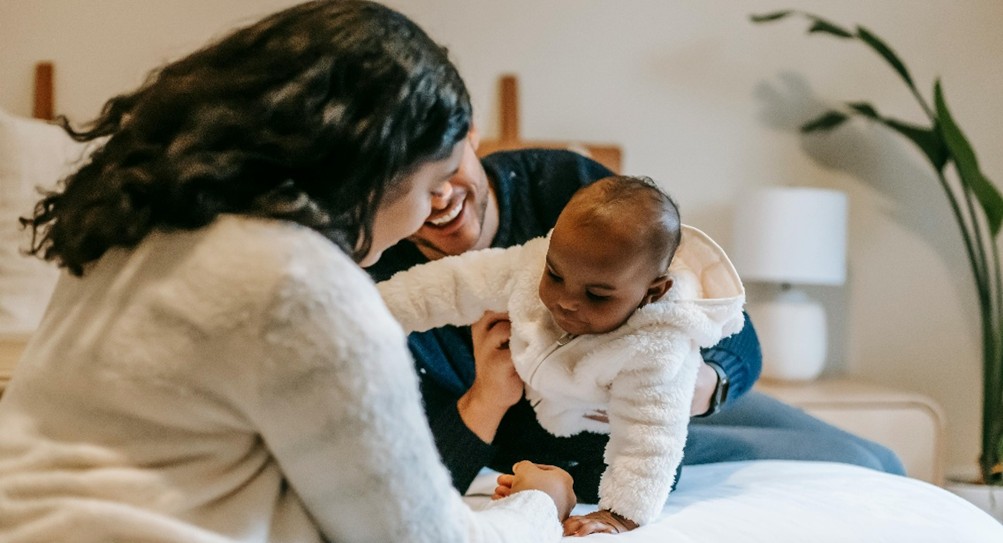
International Women’s Day: Supporting diverse new motherhoods for work inclusion
Webinar Thursday 12th March 2026, 11:00-12:30
Motherhood can have a particularly negative impact on employment for ethnic minority women. They are more likely to leave employment after the birth of their first child or to suffer workplace discrimination as a result. Wenjin Dai and Francesca Calo of The Open University Business School, alongside colleagues Fidele Mutwarasibo and Steven Parker, have conducted research to amplify the voices of ethnic minority mothers with children under school age in the UK.
They explored these women’s diverse and unique experiences and made recommendations on how policies should be designed to combine the important roles of worker and mother. Through exploring the intersectional influences of gender, ethnicity, and motherhood, the project focused on understanding how best to support mothers from diverse backgrounds.
The project team also worked with fellow OU researchers Keely Duddin and Kendal Wright and various external organisations including the Department for Work and Pensions to develop two toolkits. These are aimed at supporting mothers’ transition back into the workplace and providing strategies for employers to reintegrate them effectively. The toolkits are now available at 650 Job Centres and they have been shared with 300 employers and more than 260 Job Centre Plus coaches.
Use this link on the day to access the webinar hosted in Microsoft Teams.
Past events

Book launch: Transgender and Non-binary Prisoners’ Experiences in England and Wales (12/03/2025)
The national press in the UK have been full of stories about transgender people in carceral environments, often depicting these people as a major threat to others. But are they? Olga Suhomlinova and Saoirse O’Shea spent several years researching the lived experiences of trans people held in carceral environments in England and Wales. Their research has resulted in the recent publication of their monograph Transgender and Non-binary Prisoners’ Experiences in England and Wales. This book has been described as one that ‘should be read by [anyone] interested in learning important lessons about the nexus between gender diversity and the carceral state in England and Wales – and beyond’ and ‘the best book on any aspect of the prison experience i have read in a long time’. So, rather than reading stories in the national press, why not come along to this special seminar and book launch event to hear from Olga and Saoirse about their research and what life is actually like for transgender people in carceral environments?
This online event will be hosted on behalf of GOP by Jo Brewis, The Open University. Olga Suhomlinova is an Associate Professor at the University of Leicester, Saoirse O’Shea is a Senior Lecturer at The Open University.
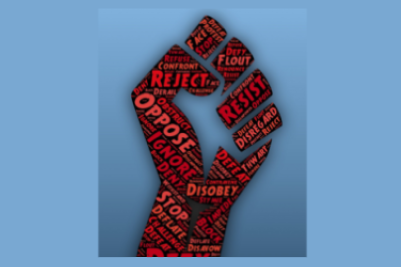
Online event: Inclusive exclusion and resistance in the marketplace: understanding the Roma through a postcolonial lens (5/02/2025)
Through this ongoing project, we hope to contribute to the dialogue on the construction of race and ethnicity in the marketplace by engaging with the Roma, the largest and most severely discriminated racial-ethnic historical minority in Eastern Europe (European Parliament, 2024). Drawing on literature in the areas of marketplace inclusion and resistance, our research aims to: (1) explore the role played by the market in enabling the inclusive exclusion of the Roma and (2) understand the ways Roma react to their inclusive exclusion in the marketplace. We employ a feminist research approach, where questions of power and inequality are considered within the research design itself. Specifically, we undertake a multi-sited qualitative study in Romania, guided by an affective methodological praxis. To engage with our data, we draw on postcolonial perspectives. Our emerging findings expose the market’s role in perpetuating the inclusive exclusion of the Roma and uncover individual, mundane acts of resistance which Roma engage in, through consumption or within the market space more broadly.
Speakers: Cristina Galalae, The Open University, UK; Tana Cristina Licsandru, Queen Mary University of London, UK
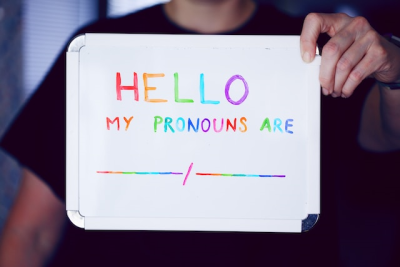
International Day Against Homophobia, Biphobia and Transphobia: Transgender and gender non-conforming (TGNC) lives and TGNC research in academia (20/05/2024)
For IDAHOBIT 2024, featuring Professor of Sociology Alison Phipps (University of Newcastle). Alison is a political sociologist and scholar of gender with interests in feminist theory and politics, the body and violence and neoliberal racial capitalism including in areas concerned with sexual violence, sex work, reproduction, and institutional cultures. Alison has also been an ally to transgender and gender non-conforming (TGNC) people for many years. Alison will be alongside Saoirse O’Shea (The Open University) in conversation about TGNC lives and TGNC research in UK academia chaired by Jo Brewis and they will discuss issues concerned with the difficulties that TGNC people and their allies face routinely in academia and society more widely.

Engaged gendered research (25/04/2024)
The Centre for Organisations and Society at Durham University Business School Organised an event in collaboration with our GOP on Engaged gendered research. GOP’s director, Dr. Nela Smolovic Jones, and one of its thematic leads, Prof. Jo Brewis, contributed alongside the eminent, Prof. Emerita Lynne Segal. In light of the core theme of ‘care’ in Lynne Segal’s work, Nela's talk focuses on caring engagement in feminist-activist ethnography and Jo's talk will be about engaging through research that matters, such as menopause at work.
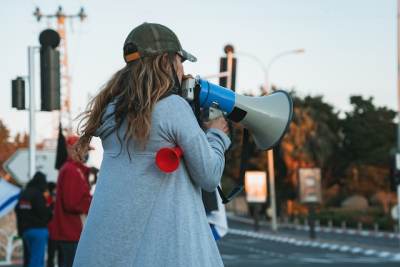
IWD Conference: Voice and Protest (08/03/2024)
Protests keep multiplying across the planet in efforts to resist widening inequalities, keep political institutions accountable and restore democracy. In response, some governments have taken legal and other measures to curb this right, silencing the voices of the marginalised, violently dispersing peaceful assemblies, making protesting nearly impossible. Even the cradles of critical voice, such as academic spaces and outlets are being co-opted into the mainstream and their critical edge blunted to the point of ineffectiveness. In this IWD mini conference we explore such developments with a range of wonderful speakers, many of whom have been engaging in activist endeavours, in academia and in broader society, for many years. The conference opens with a panel discussion on the ethical responsibility of nurturing and protecting critical voices in academia. Panellists: Marianna Fotaki, Jeff Hearn, Emmanouela Mandalaki, Mie Plotnikof, Cinzia Priola, Alison Pullen, Nela Smolović Jones, Melissa Tyler and Alice Wickström. The rest of the conference will continue exploring voice and protest through talks given by: Dr Marilyn Poon, Professor Kate Kenny and Professor Amina Mama.

Online talk: From Margins to Power: Resistance Leadership by Brazilian Women’s Collective Candidates (14/02/2024)
In this talk, Dr Carla Penha Vasconcelos will outline the transformative impact of collective candidacies on Brazil’s political representation. She will draw on the experience of Juntas feminist collective that held office from 2018–2022, to explore a resistance leadership practice involved in moving people from the margins to the centre of formal political power. This practice works via a feminist and intersectional political mandate with the participation of diverse bodies, identities, and voices of civil society. Importantly, Juntas is explored as a platform to resist traditional leadership, a unique model for future women’s collective candidacies, and a varied and intersectional example that can motivate critical leadership researchers to explore Global South leadership knowledge and practice.

Public panel: Gendering the ‘good university/business school’ by Professor Alison Pullen (06/12/2023)
In this talk, Professor Alison Pullen brings into dialogue recent discussions on feminist activism (Fotaki and Pullen, 2023; Bell et al., 2019; Calás and Smircich, 2023) and notions of the ‘good university’ (Connell, 2014) or ‘good business school’ (Rhodes and Pullen, 2023). Inspired by Butler’s questions: (2006: 49) ‘What allows us to encounter one another? What are the conditions of possibility for an international feminist coalition?’ Prof. Pullen offers some thoughts on how public and democratic business schools gain political agency through ‘gender’ working against the anti-gender movement recently articulated by Judith Butler (2023). Much relies on feminist alliances which involve struggles for recognition and the reconstitution of vulnerability, in Butler’s terms, as well as modes of reciprocity and interdependency.
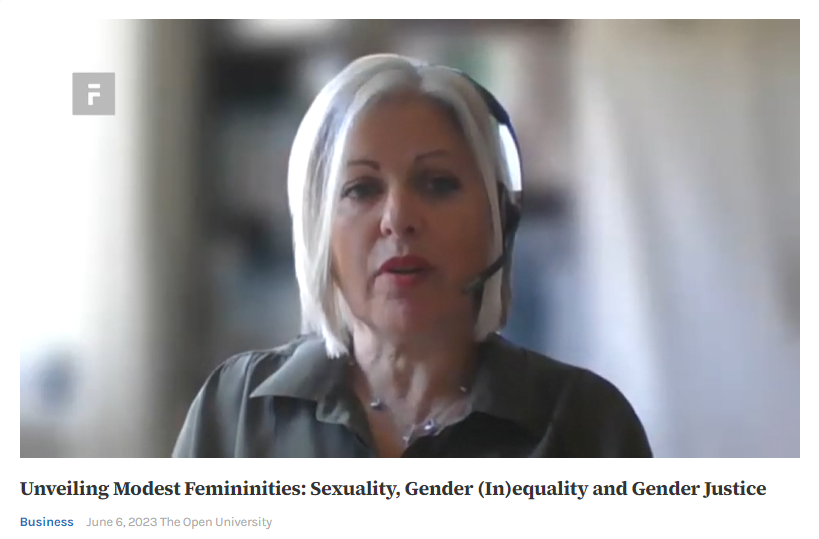
Interview: Unveiling Modest Femininities: Sexuality, Gender (In)equality and Gender Justice (06/06/2023)
Professor Cinzia Priola and Shafaq A. Chaudhry discuss the juxtaposition between gender justice and gender equality within Islamic feminism, through the empirical analysis of gender practices in Pakistani banks.
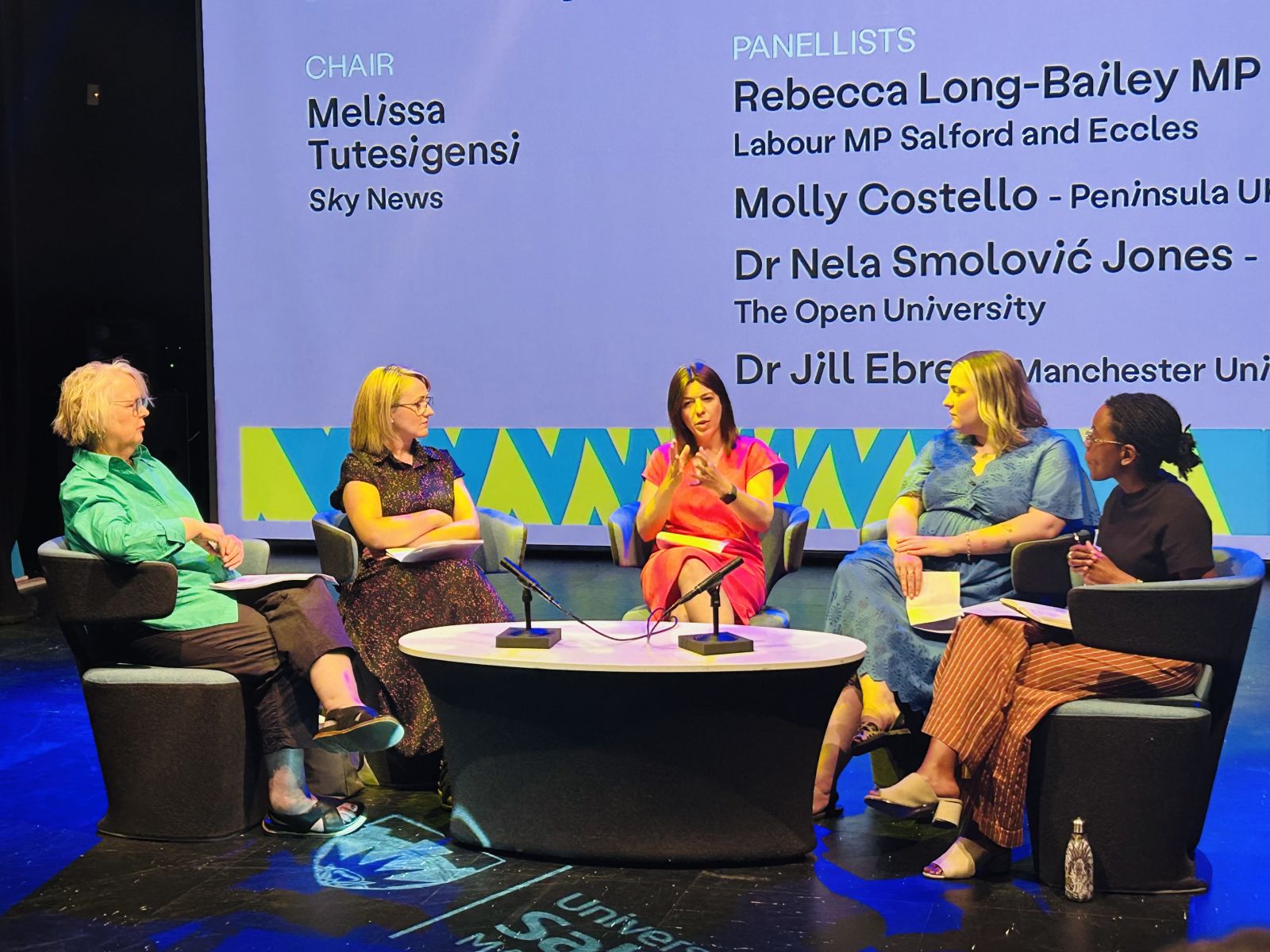
Public panel: WITW: Making work work for everyone (03/06/2023)
Nela Smolovic Jones was invited to speak on a panel at the We Invented the Weekend (WITW) festival in Manchester, organised by Hemingway Design, a partner of our Research into Employment, Empowerment and Futures (REEF) research centre. The topic of the discussion was ‘Making work work for everyone’. Nela talked about work from a gendered perspective, exploring the relationship between paid and unpaid work, unequal wealth and power distribution between genders, and how this could be changed. Other contributors were MP and former shadow cabinet minister Rebecca Long-Bailey, HR practitioner Molly Costello and academic Dr Jill Ebrey. The festival took place at MediaCity and Salford Quays last Saturday and Sunday (3-4 June) with the BBC also among its supporters.

Discussion: JEDI or EDJI - Navigating tensions and working together towards justice, equity, diversity and inclusion (19/04/2023)
Professor Alessia Contu, Dr Jared Poole and Professor Maureen Scully from the University of Massachusetts, Boston, discussed how their School navigates establishing an inclusive culture that is integrated across university activities. At UoMB, there are plenty of coordinated activities to advance justice, equity, diversity, and inclusion through research, teaching, and service. The discussion focused on two of these activities: the constitution of the College of Management Committee on Justice Equity Diversity and Inclusion, and the EDJI Lab, to reflect on the tensions and dilemmas faced in such work and to elaborate on ways forward.
The event was co-organised by GOP, FBL Athena Swan, the EDIA FBL.
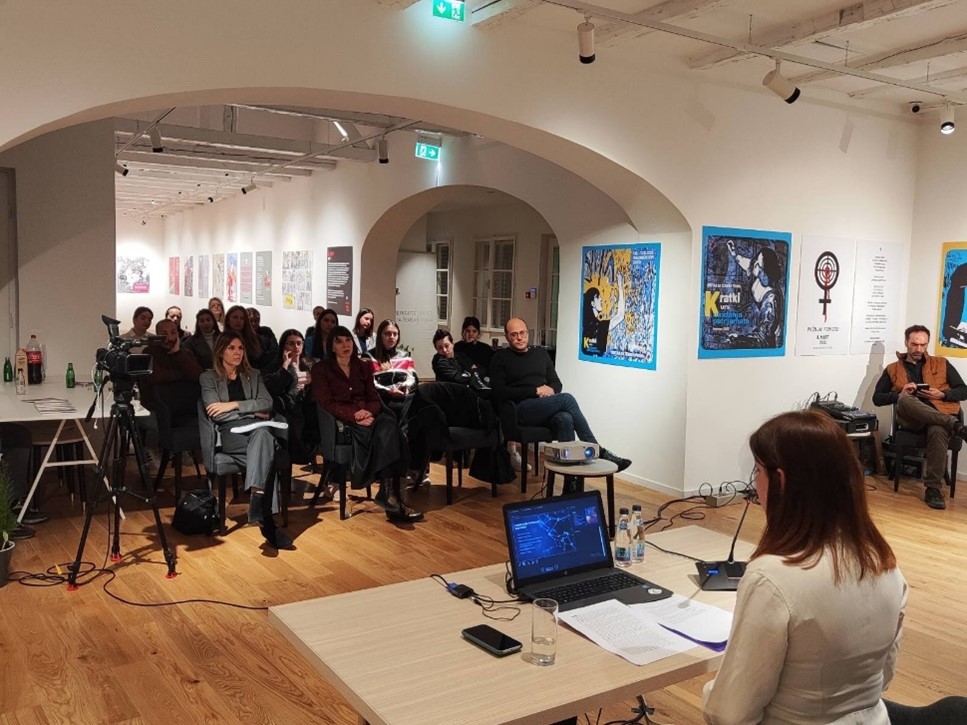
Public talk: Solidarity building through time, differences and challenges (20/03/2023)
Nela Smolović Jones was invited to deliver a public lecture in Montenegro. The lecture was hosted by the Women’s Rights Centre (WRC), a partner of our Gendered Organisational Practice research cluster, and the most reputable and successful organisation in the sphere of gender equality in the country. This well-attended knowledge exchange event on solidarity building through time, differences and challenges was based on Nela’s ongoing research on gender, democracy and work in the region. The talk particularly focused on community building within the context of ‘democratisation’, past and present, and the ways in which such a context bears on feminist practice.
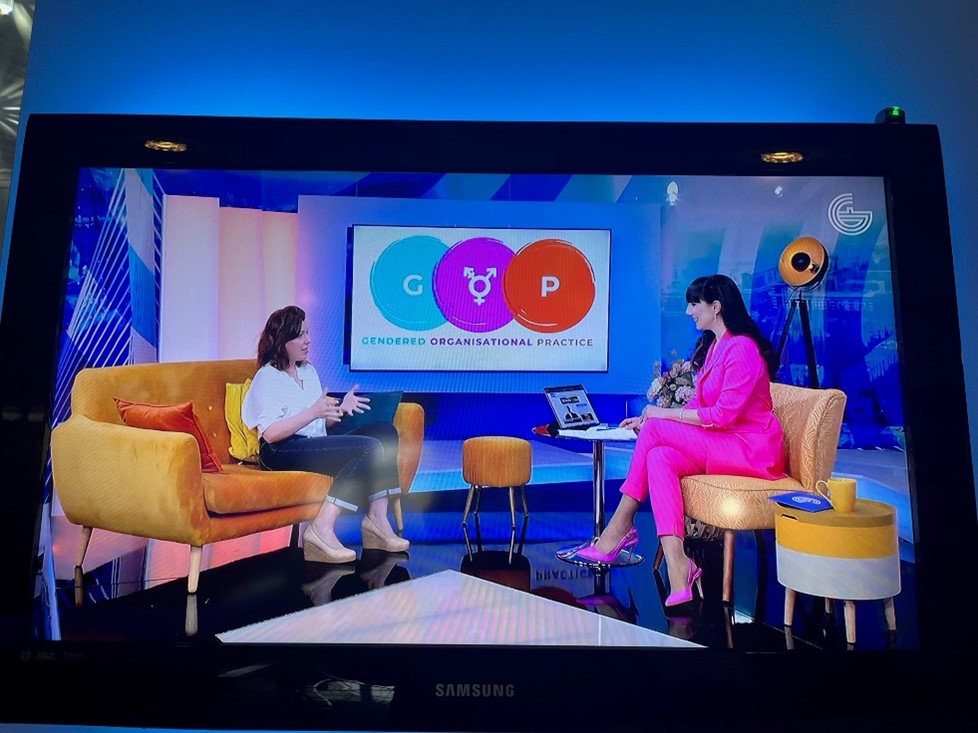
TV interview: ‘Our best and the most influential researchers in the world – Dr Nela Smolović Jones’ (09/04/2023)
Nela Smolović Jones was interviewed for a Montenegrin television programme, ‘Vikend on Gradska’, which aired on the public service broadcaster Gradska TV, about the Business School-based GOP, which she leads, and her collaborative work with the Women’s Rights Centre. The discussion focused on the wonderful work that our researchers at GOP do to enhance gender equality in organisations but also broader society. Activity discussed included: research on menopause, textile work, feminist organising through hospitality, as well as gender and sexuality. The interview also focused on the partnership between WRC and GOP and the learning on feminist democratic practice that is emerging from the collaboration.

GOP Celebration: Creating Memories and Researching from Memories (17/01/2023)
Speaker: Dr Marjana Johansson
This talk starts from a personal and political project begun a few years ago on exploring and writing classed and gendered identities and histories. The project showed the power of sharing memories for (re)writing the self, and the role of the past as a source of knowledge. It led to an exploration of memory work as a feminist method for understanding the self as situated in historical and social relations, ultimately with an emancipatory goal. On this occasion of celebrating GOP, Marjana hopes to open up a conversation about what working with memories can do, and how they might inform organisational practices.

GOP Celebration: Grounding my Gender Research – In Time (18/01/2023)
Speakers: Alessandra Fenu, Amna Sarwer, Theresa Parker and Vickie Williams
PhD projects can sometimes feel disembodied and out of sync with lived reality. Our PhD students will ‘ground’ their projects, linking them to gender issues that matter to them but, nevertheless, issues that matter to many. They will use a variety of evocative resources (textual and visual) to explore alternate temporalities and the implications for women astronauts (Alessandra), migrant BAME women working in care homes (Amna), women experiencing the menopause transition (Theresa) and women working with endometriosis (Vickie).

Film discussion: The Associate (02/12/2022)
Navigating the corporate world can be a difficult endeavour when you are marginalised from power. The Associate paints many of these issues vividly, as the main character, Laurel Ayres, portrayed by the brilliant Whoopi Goldberg, navigates the ubiquitously male world of investment banking.
The film prompts us to think about the underhand ways in which patriarchal and racial norms operate through us and others, and the practices that we enact. Bring your notes and your favourite drink and let’s chat!
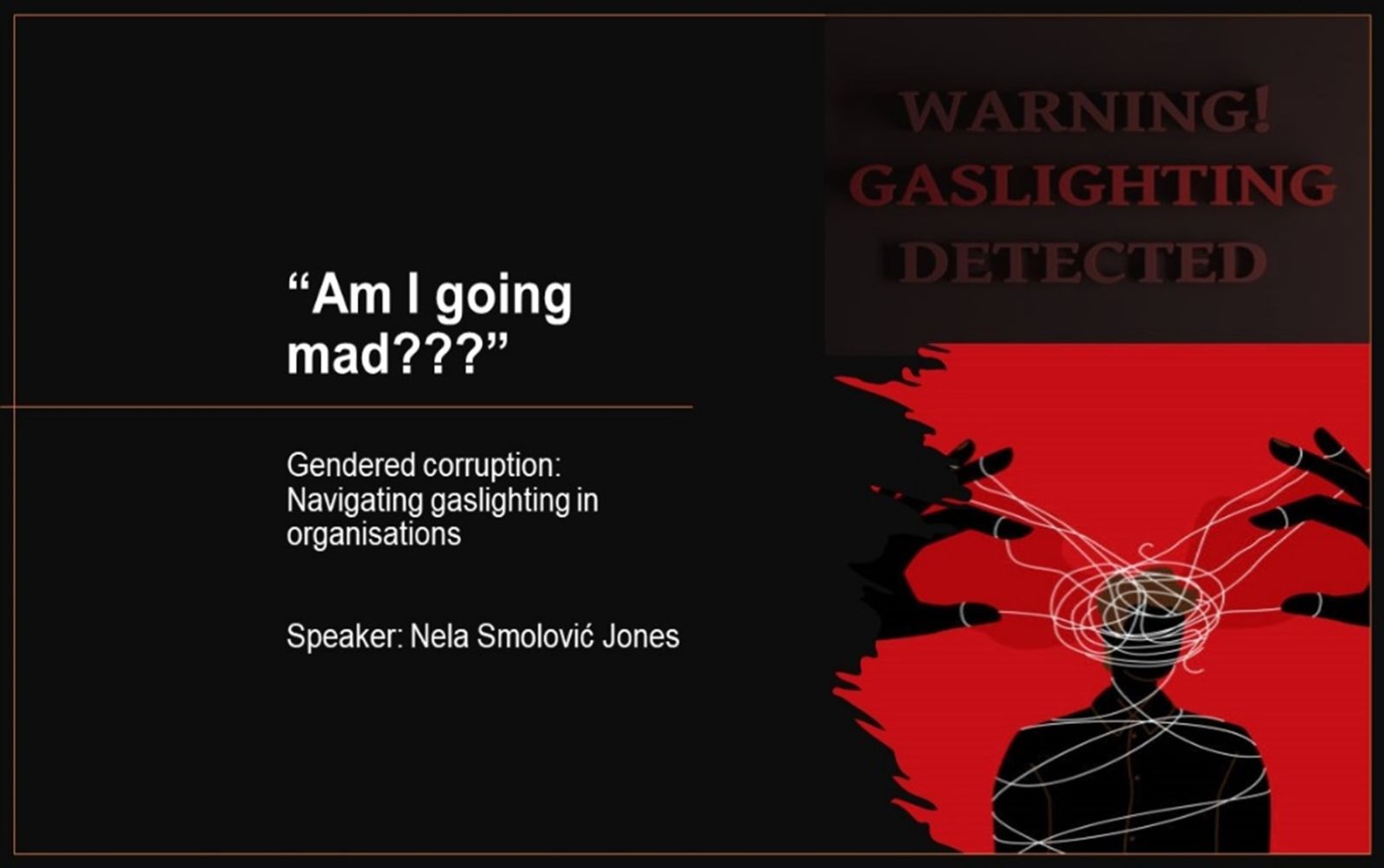
Talk: Gendered corruption - Navigating gaslighting in organisations (02/11/2022)
Speaker: Nela Smolović Jones
How does corruption adopt gendered guises and how do women combat it in practice?
From the basis of a 30-month ethnography, Nela discusses how the practice of gaslighting serves to preserve patriarchal socio-political and economic orders, facilitating the accumulation of wealth and power in the hands of (predominantly) men. Gaslighting is therefore posited as the deployment of tactics to make women doubt their sanity and as a means of securing personal advantage.
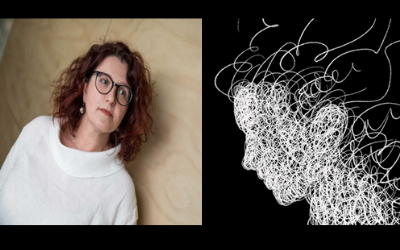
Workshops on ‘Writing about gender’ for PhD students and ECRs
As the Editor-in-Chief for Gender, Work and Organization, Prof. Alison Pullen delivered four master class workshops to PhD students on ‘Writing on gender for journals’. As a successful and globally recognised gender academic, she will also deliver a session to PhD students researching gender on her experiences of being a woman in academia.

Lesson 1: Journal writing basics (23/05/2022)
Tutor: Prof. Alison Pullen
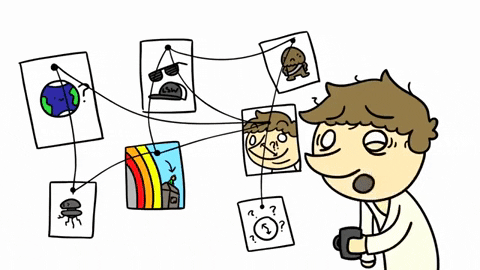
Lesson 2: Developing theory from empirical research (15/06/2022)
Tutor: Prof. Alison Pullen

Lesson 3: Different styles of writing (12/09/2022)
Tutor: Prof. Alison Pullen

Lesson 4: Managing the review process (10/10/2022)
Tutor: Prof. Alison Pullen

Talk: 'The air that we breathe’: Recognition, respiration and ambivalence (07/09/2022)
Speaker: Professor Melissa Tyler
Why are people so prone to division and destruction when we need one another to survive? This is a critical question in the wake of a global pandemic and the climate crisis. Thinking critically about the social relations of something as fundamental as breathing helps us to understand how our desire for recognition comes to be organized in ways that oppress and exploit us, but which also open up scope for rethinking how we live and work together. As recent and ongoing global events have shown us, our social positioning is such that if we are all vulnerable, we are by no means equally so. If COVID and the climate emergency have taught us anything, it is that ‘exposure is … a socially organized relation’ (Butler, 2020: 199).

Discussion: GaGa Euphoria (17/05/2022)
This workshop explored the concepts of gender euphoria and gaga feminism. The former has been described by some trans people as the joy that they have felt when they first experience an unbounded sense of self. Gaga feminism, for Jack J Halberstam, is an attempt to open gender up from the limited and limiting cis-het binary and to celebrate other genders and gender identities. Gaga feminism is a call for feminists to be creative in how we understand and live our genders unlimited by the societal conventions and norms of patriarchy.
To paraphrase the Lady Gaga song 'Do what you want':
"You can't have my heart
And you won't use my mind but
Do what you want with your body"

Public talk: Streets, Struggles and Solidarities (08/03/2022)
In this special International Women’s Day event Professor Alison Pullen explored the street as a powerful democratic institution that challenges the gendered division of public and private spheres.
‘Street is a metaphor of the possibility of assembly but also a metaphor for the reality of discrimination. Public space is both ambivalent and open to possibility. Public space movements which reclaim the street such as Reclaim the Night is not just about the vital importance of physical security for feminized subjects but also about a material site for the political potential of the embodied collective living and working together in pursuit of the promise of equality. This is a question of the public expression and realization of solidarities and struggles across and within intersectional differences. The street is the public space not accounted for in the historical distinction between the public- masculine – and the private – feminine.
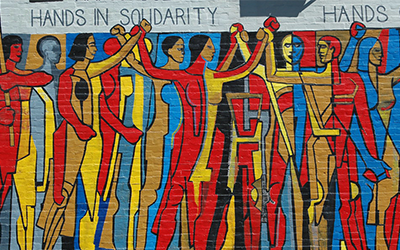
Solidarity across difference (08/03/2022)
In contemporary times, in which many different groups of marginalized people need to continuously struggle for basic survival, justice and equality, practices of solidarity are paramount to create mutual commitments across different needs. But how can solidarity be practiced across such wide variety of experiences and standpoints without creating fragmentation or fortifying existing forms of domination and oppression? Taking inspiration from Black feminist and postcolonial conceptions of solidarity, Nela Smolovic Jones and Bontu Lucie Guschke discussed if solidarity can and should be forged around commonalities or particularities, considered how we can make difference productive for critique and action, and finally, where to draw a line when it comes to inclusivity and solidarity, or, to borrow from Mouffe, how to differentiate between ‘adversaries’ and ‘enemies’?

Early pregnancy endings and the workplace (08/03/2022)
Although organization studies has an established and growing literature on the intersections between (post-)reproductive bodies and the workplace in the shape of research on menstruation, menopause, pregnancy, maternity and the menopause, it has paid almost no attention to terminations and miscarriages. Yet these experiences are extremely common and some women and transgender and non-conforming people will go through several miscarriages and/ or terminations during their working lives. As such we are committed to finding out more about what it is like to navigate an early pregnancy ending (defined as up to 24 weeks of completed gestation in the UK) whilst in paid employment of any kind, as well as paying close attention to differences like gender, ethnicity, disability and age.
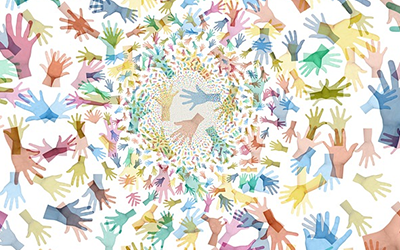
International Women’s Day event: Solidarities at work (08/03/2022)
Throughout history, feminists have been forging solidarity to disrupt sites of power and privilege, redraw the boundaries of inclusion and exclusion and access to resources. Following in their footsteps, we are moving the conversation and practices further. This one-day online interdisciplinary conference brings together diverse voices on the complexities, complications, and configurations of working with and across intersections and the dilemmas that feminist activism and praxis present. The conference aims to extend conversations on existing challenges and opportunities while also giving rise to new possibilities.
A wide variety of academics and practitioners came together to discuss the importance of solidarities in an inclusive and purposeful manner.
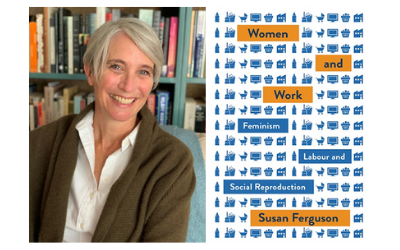
Public talk: ‘Help! I’ve been historically overworked.’ (03/02/2022)
As we’re pushing through yet another industrial revolution, exacerbated by the pandemic and underpinned by technology, we are leaving a trail of weary women’s bodies behind us – Caryatids of capitalist production. So how can we make sense of this present moment and what can we do to make life better for the working women of the world?
In this GOP event, leading scholar of work and social reproduction Sue Ferguson helped us make sense of these questions by guiding us through more than two centuries’ worth of theorising about women’s unpaid labour, as well as their relationship to waged labour.

Video discussion: Why women are paid less? Gender pay gap (16/12/2021)
To warm-up for the Sue Ferguson’s talk, GOP members met to discuss the gender pay gap. As we are busying ourselves with meeting various deadlines, the holidays are slowly sneaking up on us. That time of the year when we are prompted to examine our generosity by reaching into our purses to buy presents, cook for the extended family, clean after them… listen to cousin Bob’s ‘political correctness gone mad’ speech… You know, the usual holiday joy. Holidays are also times to kick back, celebrate and enjoy…But then again, just like Peggy Lee in 1953, we also can’t help but wonder: Who’s Gonna Pay the Check?

Breaking Bad: Challenging the heteronormative environment in the UK’s police and prisons (17/05/2021)
GOP marked the International Day Against Homophobia, Transphobia and Biphobia with this special event where Dr Matthew Jones and Dr Saoirse O’Shea presented their research about the lived experiences of transgender and non-binary prisoners in England and Wales, as well as the ways in which lesbian, gay and bisexual police officers proactively challenge the occupational culture of policing from engaged and insightful researchers with unique access to these contexts.

International Workers’ Day public talk: Why work won’t love you back (12/04/2021)
The talk was delivered by Sarah Jaffe, an insightful journalist whose writing on labour has engaged the readership of The New York Times, The Guardian, The Nation and the numerous other media outlets. However, and fortunately for those of us who enjoy reading and thinking about the nature of work, Sarah has recently decided to amalgamate her talent for writing, her methodical approach to research and her stubborn dedication to justice and equality into the book Necessary Trouble and the book we discussed at this event called Work won’t love you back: How devotion to our jobs keeps us exploited, exhausted and alone.
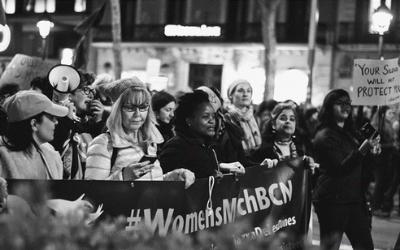
Workshop: Feminism and social movements (24/03/2021)
The OU’s Gendered Organisational Practice research cluster (GOP) and the Gender, Work and Organization journal (GWO) hosted a joint workshop on feminism and social movements. The workshop’s aim was to develop knowledge on how women can enhance social movements as vehicles for attaining equality, ahead of a special issue on the same topic for GWO.
This workshop was organised by the editors of the special issue (Nela Smolović Jones; Alison Pullen; Marjana Johansson; and Katarina Giritli-Nygren) to help researchers develop their ideas into papers for submission to the GWO special issue under the same name.

International Women’s Day public talk: Politics of care (08/03/2021)
Prof. Emerita Segal made the case for a politics of care – for care to be at the heart of all aspects of contemporary life. In her talk, Lynne invited us to reimagine the role of care in our everyday lives, urging us to make it the organising principle in every dimension and at every scale of life. We are all dependent on each other, and only by nurturing these interdependencies can we cultivate a world in which each and every one of us can not only live but thrive.

Business Network Briefing: Why menopause is a workplace issue (09/02/2021)
Prof. Jo Brewis presented on why menopause is a workplace issue to an audience of predominantly HR practitoners, managers and employers. With her research, Jo aims to advance organisational practice so that workplaces are more responsive to people’s needs and more embracing of diverse experiences. Within this broad area, Jo has conducted prominent and impactful research on menopause, one part of which currently represents the most comprehensive study on menopause in the workplace. Together with her research team, she also wrote a commissioned government report, The effects of menopause transition on women's economic participation in the UK (2017).

Roundtable discussion: Attacks on gender researchers and gender equality initiatives within organisations (04/12/2020)
This event was hosted by Stefanie Ruel and Nela Smolović Jones. It came about as a response to the increasing hostility towards women and members of the LGBT+ community during the pandemic but also, more broadly, amidst the rise of far-right politics globally, which contributes to an erosion of gender equality and women’s rights.
Our work
This is where people can find the latest publications on gender from our academics and gender research projects
- Brewis, J. (2022) Menopause in the Brazilian Workplace: A Research Agenda for Scholars of Management and Organization Studies, Revista de Administração de Empresas, 62, Article e0000-0023(4)
- De Souza, E.M., Brewis, J. and Godfrey, R. (2022) Abjection in extremely gendered colonial organizations: female military firefighter officers in Brazil - Open Research Online, Human Relations, OnlineFirst.
- O'Shea, SC (2022). (Book Review). Book review of P.B. Preciado Can the monster speak? Gender, Work and Organization. On-line ahead of print September 2022 https://doi.org/10.1111/gwao.12901
- O'Shea, SC (2022). (Book Review). ‘Nothing compares to you’ book review of C. Cremin The future is Feminine, Transgender Studies Quarterly 9(2), pp. 287-290.
- Beck, V., Brewis, J. and Davies, A. (2021) Women’s experiences of menopause at work and performance management, Organization, (28)3: 510-520.
- Atkinson, C., Beck, V., Brewis, J., Davies, A. and Duberley, J. (2021) Menopause and the workplace: new directions in HRM research and HR practice, Human Resource Management Journal, 31(1): 49-64.
- Smolović Jones, S. (2022). Gaslighting and dispelling: Experiences of NGO workers in navigating gendered corruption. Human Relations (Accepted Manuscript).
- Cervi, L. and Brewis, J. (2022) Fertility treatment and organisational discourses of the non-reproductive female body Gender, Work and Organization 29(1): 8-27
- Smolović Jones, S., Winchester, N., and Clarke, C. (2021) Feminist solidarity building as embodied agonism: An ethnographic account of a protest movement. Gender, Work & Organization 28(3): 917-934
- Hollis, D., Wright, A. Smolović Jones, O. and Smolović Jones, S. (2021). From “pretty to pretty powerful”: The communicatively constituted power of facial beauty’s performativity. Organization Studies 42(12): 1885-1907
- Smolović Jones, O., Smolović Jones, S., Taylor, S., and Yarrow, E. (2021). ‘I wanted more women in, but...’: oblique resistance to gender equality initiatives. Work, Employment and Society, 35(4), 640-656
- Weller, S., Clarke, C. and Brown, A.D. (2021) ‘Volunteering Masculinities in Search and Rescue Work: Is There A ‘Place For Girls On The Team’?’ Gender, Work and Organization
- O’Shea, S. C. (2021). If I knew then what I know now. Gender, Work & Organization, 29(2): 626-638)
- Bend, G. and Priola, V. (2021) ‘There is nothing wrong with me’: The Materialisation of Disability in Sheltered Employment. Work, Employment and Society, Online First. Full text available on ORO at ‘There Is Nothing Wrong with Me’: The Materialisation of Disability in Sheltered Employment - Open Research Online
- De Simone, S. and Priola, V. (2021) ‘Who’s that Girl?’ The entrepreneur as a super(wo)man. Canadian Journal of Administrative Science, Early View https://doi.org/10.1002/cjas.1643
- Priola, V. and Chaudhry S.A. (2021) Unveiling modest femininities. Sexuality, gender (in)equality and gender justice. British Journal of Management, 32(2), 306-321. Full text available on ORO at Unveiling Modest Femininities: Sexuality, Gender (In)equality and Gender Justice - Open Research Online
- Smolović Jones, O., Smolović Jones, S.., Taylor, S., and Yarrow, E. (2020). Theorizing gender desegregation as political work: The case of the Welsh Labour Party. Gender, Work & Organization
- Priola, V. and Pecis, L. (2020) Missing voices: The absence of women from Italy’s Covid-19 pandemic response. Gender in Management. An International Journal, 32(7/8), 619-627. Full text available on ORO at Missing voices: The absence of women from Italy’s COVID-19 pandemic response - Open Research Online
- Pecis, L. and Priola, V. (2019) "The “new industrial man” as un-hero: doing postfeminist masculinities in an Italian pharmacological research centre". Gender, Work and Organization’, 26 (10), 1413-1432. Full text available on ORO at The “new industrial man” as un-hero: doing postfeminist masculinities in an Italian pharmacological research centre - Open Research Online

.png)